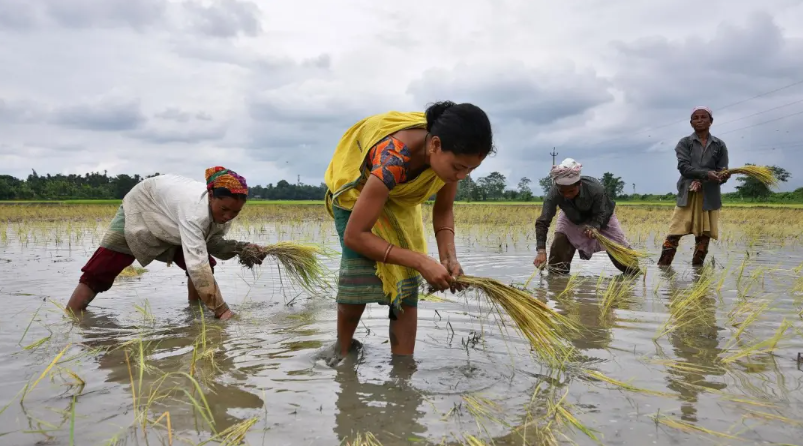The Government of India has always prioritized the welfare of farmers, launching numerous schemes to boost agricultural productivity, ensure income security and promote sustainable practices. These agriculture-focused schemes play a critical role in transforming rural India and helping farmers access resources, infrastructure and market opportunities.
Top Agriculture Schemes in India for Farmers
Here is a list of some of the most beneficial and most demanding agricultural schemes for farmers in India. Let’s have a quick look into it:
PM-Kisan Samman Nidhi Yojana (PM-KISAN)
Launched in December 2018, this flagship income support scheme provides ₹6,000 per year in three installments to small and marginal farmers owning up to 2 hectares of land. The amount is directly transferred to farmers’ bank accounts, benefiting over 12 crore farmers. So far the government has released 19 installments under PM Kisan yojana.
PM Kisan Maandhan Yojana
This voluntary pension scheme ensures monthly pensions of ₹3,000 to enrolled farmers after the age of 60. Farmers aged 18 to 40 years contribute ₹55 to ₹200/month, matched by the government. It provides financial security in old age to around 5 crore marginal farmers in the country.
PM Fasal Bima Yojana (PMFBY)
A comprehensive crop insurance scheme that protects farmers against crop loss due to natural calamities. Premium rates are subsidized:
2% for Kharif crops
1.5% for Rabi crops
5% for horticultural/commercial crops
Claim settlement is fast-tracked, with payment due within 60 days of harvest.
Kisan Credit Card (KCC) Scheme
Introduced in 1998, KCC provides short-term credit for farming needs. It also covers fisheries and animal husbandry. The scheme ensures easy access to affordable credit through banks like SBI, ICICI, HDFC and Axis.
Pashu Kisan Credit Card Scheme
Designed for livestock farmers, this scheme offers loans for purchasing animals such as cows, buffaloes and goats. Haryana was the first state to implement this initiative, which helps boost the animal husbandry sector.
Paramparagat Krishi Vikas Yojana (PKVY)
This scheme promotes organic farming by encouraging eco-friendly practices and improving soil health. It targets 5 lakh acres through 10,000 clusters (50 acres each), with a focus on sustainable and profitable agriculture.
PM Krishi Sinchai Yojana (PMKSY)
Launched in 2015 under the motto “Har Khet Ko Pani”, PMKSY ensures irrigation access and promotes micro-irrigation through four components:
Accelerated Irrigation Benefit Programme
Har Khet Ko Pani
Watershed Development
Per Drop More Crop. It integrates water conservation and rainwater harvesting techniques to ensure efficient water use.
National Agriculture Market (e-NAM)
e-NAM is a unified online trading platform that connects over 1,000 APMCs (mandis) nationwide, allowing farmers to sell their produce transparently at competitive prices. It supports “One Nation, One Market” and enhances price discovery.
Dairy Entrepreneurship Development Scheme (DEDS)
Formerly the Venture Capital Scheme for Dairy and Poultry, DEDS supports small dairy entrepreneurs by financing modern dairy farms, cold chains and milk processing units. Operational since 2010, it strengthens India’s dairy infrastructure.
Rainfed Area Development Programme (RADP)
Implemented under RKVY, RADP enhances the livelihood of farmers in rainfed areas through composite farming systems. It minimizes the impact of erratic rainfall and promotes sustainable agricultural practices by integrating cropping, livestock and agroforestry.
Rajiv Gandhi Kisan Nyay Yojna
Exclusive to Chhattisgarh, this state-led scheme ensures income support to farmers cultivating 13 Kharif crops and 1 Rabi crop. Payments are made through direct bank transfers, incentivizing consistent cultivation and reducing rural distress.
Soil Health Card Scheme
Launched in 2015, this initiative provides farmers with detailed soil analysis and fertilization recommendations. It helps optimize the use of nutrients, improves soil fertility and promotes balanced and scientific use of fertilizers.
National Mission for Sustainable Agriculture (NMSA)
Part of the National Action Plan on Climate Change, NMSA focuses on promoting climate-resilient agriculture through:
Rainfed Area Development
Agro-Forestry
Soil Health Management
Organic Farming (PKVY, MOVCDNER)
National Rainfed Area Authority
The mission helps mitigate the impact of climate change on Indian agriculture.
Rythu Bandhu Scheme (Telangana)
This pioneering scheme offers ₹5,000 per acre per crop season to over 58 lakh farmers for both Kharif and Rabi crops. It is India’s first direct investment support scheme, ensuring timely availability of working capital.
Livestock Insurance Scheme
Aims to protect farmers and cattle rearers from financial loss due to livestock death. It encourages insurance adoption among dairy farmers and supports livestock development through risk mitigation.
Prime Minister Dhan-Dhaanya Krishi Yojana (PMDDKY)
On 16th July 2025, the Union Cabinet approved the PM Dhan-Dhaanya Krishi Yojana (PMDDKY), a transformative new initiative aimed at catalyzing agricultural growth in 100 agri-districts. Announced in the Union Budget 2025-26, the scheme emphasizes saturation-based convergence of 36 Central schemes from 11 ministries, with an annual outlay of ₹24,000 crore for six years. Inspired by the Aspirational Districts Programme, the model emphasizes real-time monitoring and data-driven planning. PMDDKY is expected to directly benefit 1.7 crore farmers, focusing on improving productivity, income, and infrastructure.
Conclusion
India’s agricultural transformation hinges on these farmer-centric government schemes that cover a wide spectrum of needs – from income support, credit, insurance, irrigation, organic farming, market access, to climate resilience. With the addition of PMDDKY, the focus is now on integrated planning, saturation coverage and impact-driven delivery.
Farmers are encouraged to stay updated and connected with local authorities, Krishi Vigyan Kendras (KVKs) and digital portals to fully benefit from these schemes and programs.






